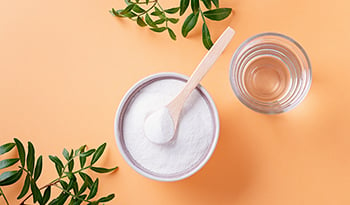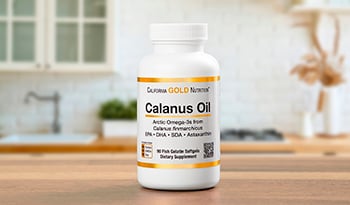5 Lesser-Known Supplements + Why a Dietician Wants You to Know Them
DISCLAIMER:This blog does not intend to provide diagnosis...
- In this article:
- 1. Berberine
- 2. Rhodiola Rosea
- 3. Olive Leaf Extract
- 4. Modified Citrus Pectin
- 5. Vitamin K
- Takeaway

An estimated three-quarters of Americans take at least one dietary supplement a day. And if you’re like me, you use a number of products to support your well-being.
Perhaps you take a multivitamin-mineral supplement daily and have zinc, elderberry extract, or vitamin C on hand for cold and flu season. You may also take supplements like fish oil, collagen, vitamin D, calcium, magnesium, or CoQ10 and use a probiotic product to enhance gut health.
But there are many other supplements under the radar that you should get to know. Here are five to consider adding to your wellness regimen.
1. Berberine
Would you like to lower your blood sugar and cholesterol levels and reduce inflammation? You may want to talk with your physician about adding berberine to your supplement regimen.
A bioactive alkaloid compound, berberine is found in the bark, roots, and leaves of approximately 450 to 500 plants, including barberry, turmeric, goldenseal, and Oregon grape. Like turmeric, berberine (aka Natural Yellow 18) is yellow and was once widely used to dye wool and leather.
Berberine has been used medicinally for over 3000 years. Assyrian clay tables dating back to 650 BC describe it as a blood purifier. It has a variety of therapeutic uses, multiple mechanisms of action, and a long history of use in traditional Chinese and Ayurvedic medicine, as well as in South America.
Traditionally, berberine has been used to treat skin, digestive, and respiratory diseases; heal tumors, infections, and wounds; cure hemorrhoids, indigestion, and dysentery; and reduce fevers. Currently, it is used in China as an over-the-counter antibacterial treatment for diarrhea.
Berberine works on a cellular level by stimulating an enzyme called adenosine monophosphate-activated protein kinase (AMPK). AMPK regulates the energy of cells and is involved in many biological processes. In addition, the plant compound has antifungal and antibiotic properties that can fight certain infections and improve your body’s microbiome.
Lower Blood Sugar
Research suggests berberine can significantly lower blood sugar levels in people with type 2 diabetes and may be as effective as the diabetic medication metformin. A 2008 randomized clinical trial of 116 patients with type 2 diabetes and dyslipidemia (unhealthy levels of one or more types of fat in your blood) found that “berberine is effective and safe in the treatment of type 2 diabetes and dyslipidemia.”
Berberine impacts glucose metabolism by improving insulin resistance, promoting insulin secretion, slowing down the breakdown of carbohydrates, and inhibiting glucose production in the liver.
Heart Health
Berberine may also help protect the cardiovascular system. A systemic review and meta-analysis of randomized controlled trials found that taking berberine helped significantly decrease total cholesterol, triglycerides, and LDL cholesterol while increasing HDL (good) cholesterol. Another study found taking 500mg of berberine twice a day for three months lowered cholesterol by 29%, triglycerides by 35%, and LDL cholesterol by 25%.
Research suggests berberine may reduce injury in ischemic conditions such as during a stroke or heart attack. It may also lower blood pressure and reduce antioxidant stress.
Cognitive Health
Berberine also benefits the nervous system. Research suggests berberine may slow down the development of Alzheimer’s and help treat mood disorders such as depression and bipolar disorder.
Improved Liver Function
Berberine may also help improve liver function, especially in people with nonalcoholic fatty liver disease. A meta-analysis of six randomized controlled trials looking at berberine as a treatment for nonalcoholic fatty liver disease (NAFLD) concluded, “berberine has positive efficacy on blood lipids, blood glucose, liver function, insulin resistance, and fatty liver condition of NAFLD patients.”
Weight Loss
While there is less research on berberine and weight loss, a few studies have found it may lower body mass index (BMI). In a clinical trial of 37 men and women between the ages of 32 of 68 with newly diagnosed metabolic syndrome (a combination of high lipids, high blood sugar, and high blood pressure), those who took .3 g of berberine three times a day for 12 weeks experienced significant decreases in BMI from 31.5 to 27.4. One animal study found berberine improved the metabolism of mice fed a high-fat diet.
Cautions
Clinical trials show that berberine is generally safe but interacts with certain medications—especially those taken for diabetes and high blood pressure. So, talk with your doctor before taking berberine. Children, women who are pregnant or breastfeeding, and people with certain plant allergies should not take berberine.
2. Rhodiola Rosea
Feeling stressed, anxious, or exhausted? Want to increase energy and overall vitality and well-being? You may want to check out Rhodiola rosea. Also known as rosenroot, golden root, arctic root, and Hongjingtain in Chinese, Rhodiola rosea is a medicinal plant found in cold regions and high altitudes in the Arctic, Asia, and Europe.
Reported to have anti-aging effects, rhodiola has been used in traditional medicine in Russia, Scandinavia, and other parts of Europe for centuries to enhance healing, treat fatigue and weakness, alleviate stress, and increase well-being. Today, it’s used to increase energy and stamina, improve athletic performance, and manage stress and anxiety.
A Potent Adaptogen
Like Asian ginseng, ashwagandha, and some medicinal mushrooms (cordyceps and lion’s mane), rhodiola is an adaptogen—a natural substance that helps the body deal with physical, environmental, and emotional stressors and improves homeostasis. In general, adaptogens are also beneficial because they tend to be non-toxic when taken in normal doses.
Adaptogens have a double impact—they stimulate the release of stress hormones and boost energy metabolism. They can also increase or decrease chemical reactions in the body depending on what you need. When you feel stressed, adaptogens help lower cortisol levels. When you are tired, they can increase cortisol levels, providing more energy to get things done.
Currently, rhodiola is the primary adaptogen for stress approved by the Committee on Herbal Medicinal Products (HMPC), the European Medicines Agency’s committee responsible for compiling and evaluating scientific data.
Relief From Burnout
One of the most exciting areas of rhodiola research is around its use for treating burnout. The World Health Organization (WHO) recognizes burnout as a widespread problem and defines it as “a syndrome conceptualized as resulting from chronic workplace stress that has not been successfully managed.”
A clinical trial of 118 people ages 30 to 60 suffering from burnout found that daily treatment with 400mg of rhodiola extract for 12 weeks improved a wide range of outcomes associated with the syndrome. Improvements were seen in as little as a week and continued to improve over the course of the study with few adverse side effects.
Increased Alertness and Mood
Feeling down or unfocused? Rhodiola may help fight fatigue while improving cognition, concentration, and mood. In a study of 100 people with prolonged or chronic fatigue symptoms, those who took 400mg of rhodiola daily for eight weeks reported experiencing less stress and tiredness and improved mood, focus, and quality of life.
In another study, patients who took 170mg of rhodiola extract a day for six weeks experienced a significant reduction in overall depressive symptoms, including insomnia, emotional instability, and somatization (physical symptoms associated with stress and emotions, such as headaches, fatigue, and back pain).
Animal studies have found that rhodiola may enhance brain function and boost mood and memory. This adaptogen is also being investigated as a treatment for several aging-related diseases, including Alzheimer’s.
Use and Safety
Rhodiola is typically taken as a supplement made from the root powder or as a standardized extract. You can add rhodiola to food or drinks, take it as a capsule, or in a tincture. According to the National Center for Complementary and Integrative Health, rhodiola has been used safely in studies lasting six to 12 weeks. However, there isn’t much information about whether it’s safe to use during pregnancy or while breastfeeding.
3. Olive Leaf Extract
You probably know that olive oil is a rich source of healthy fats and antioxidants and is excellent for marinades, salad dressings, and sautés. But did you know that extract made from the leaves of the olive tree has many health benefits? Numerous studies suggest the extract may do everything from lowering blood pressure and cholesterol to supporting weight loss.
A symbol of heavenly power, the olive plant has been used medicinally for centuries. It dates as far back as ancient Egypt, where it was used in mummification ceremonies. According to legend, Athena, the goddess of wisdom, gifted the olive tree to humanity. Olive leaf is still used in traditional medicines in countries including Greece, Italy, and Spain to treat flu and the common cold, fight infection, and heal the skin.
The plant’s health benefits are largely due to oleuropein, a polyphenol found in the leaves and oil. Like vitamin C and vitamin E, oleuropein acts as an antioxidant, offsetting oxidative stress and reducing inflammation. Animal studies suggest oleuropein may support heart health by lowering cholesterol and blood pressure, reducing atherosclerosis, and protecting the heart from damage.
Population studies have consistently shown that people who eat a Mediterranean diet, which includes ample amounts of olive oil along with plenty of fruits, vegetables, legumes, whole grains, and fish, and fewer servings of red meat, have a lower incidence of chronic disease. Research indicates oleuropein may be the chemical in olive oil responsible for the anti-tumor activity.
Support for Diabetes
Traditional medicine often uses a combination of olive leaf extract, turmeric, and fenugreek to manage diabetes. All three may improve how the body uses insulin, the hormone responsible for getting glucose from the bloodstream into cells. Animal studies show that olive leaf extract reduces hyperglycemia and hyperinsulinemia.
Weight Management
Olive leaf extract may also help you manage your weight. In animal studies, olive leaf extract has helped prevent obesity and reduce visceral fat accumulation, and serum lipid levels in mice fed a high-fat diet. Scientists believe it works by changing fat-producing molecules on a genetic level, so they store less fat.
Other Benefits
Animal studies suggest oleuropein may protect the liver and prevent the progression of non-alcoholic fatty liver disease. Additional research is looking into the neuro-protective effect of oleuropein to prevent or reduce damage or loss from Parkinson’s disease and Alzheimer’s.
The antimicrobial property of oleuropein may improve resistance to microbes that can make you ill, like salmonella and antibiotic-resistant bacteria. The antiviral properties of oleuropein may also help combat herpes and HIV. Anecdotal reports suggest that taking olive leaf extract when cold or flu symptoms start may prevent or shorten the duration of the illness. Gargling with olive leaf tea may also help heal a sore throat by decreasing inflammation and viral activity.
Use and Safety
Olive leaf extract is available as a supplement, tea, or tincture. Research suggests doses of 500 to 1,000mg daily provide beneficial health effects. This supplement may lower blood pressure and blood sugar levels, so it’s important to talk with your doctor if you have been diagnosed with hypertension or diabetes. Pregnant or breastfeeding women may want to avoid olive leaf extract as there isn’t enough data showing it’s safe for these populations.
4. Modified Citrus Pectin
Many people take fiber—the part of plant foods that we don’t digest—as a supplement to help with elimination, improve gut health, lower cholesterol levels, aid weight management, and help control blood sugar levels. Common fiber supplements come from psyllium, oats, and other grains and seeds.
Modified citrus pectin (MCP) is another type of supplemental fiber that you may not have heard of. It’s made from the peels and pulp of citrus fruits such as oranges, lemons, limes, and grapefruit. Since the body can’t absorb pectin directly, the pectin in the fruit peels is altered so it can be absorbed into the bloodstream and used by the body.
It also may help with detoxification by removing (chelating) toxic metals such as arsenic, cadmium, and lead without lowering levels of beneficial minerals like calcium, magnesium, and zinc.
Lower Cholesterol
Several studies have shown that both modified and unmodified pectin can help prevent heart disease by lowering cholesterol and blood pressure. A randomized clinical trial found that taking pectin combined with guar gum reduced LDL cholesterol by 12.1% in subjects with mild to moderately high levels.
Digestive Balance
MCP also may support the digestive system. Like a prebiotic, it helps improve microbiome health by increasing the ratio of good to bad bacteria in the gut.
Research has shown that MCP may help reduce symptoms associated with irritable bowel syndrome (IBS). A randomized controlled trial of 87 patients with IBS and diarrhea demonstrated that subjects who took MCP daily had significantly fewer symptoms, more formed stools, and better quality of life compared to controls.
5. Vitamin K
First discovered in 1929 in Germany, vitamin K gets its name from the German word “Koagulationsvitamin.” Vitamin K is a fat-soluble vitamin that affects how many proteins function in the body. The proteins prothrombin, responsible for blood clotting, and osteocalcin, which makes healthy bone tissue, require vitamin K.
Along with being essential for blood clotting, vitamin K contributes to bone and heart health, improves insulin sensitivity, and may reduce chronic disease risk. Vitamin K works by helping ensure calcium goes where it’s needed (the bones) and not where it isn’t (blood vessels and kidneys). Research suggests it may help prevent fractures due to osteoporosis and vascular calcifications that can increase the risk of cardiovascular disease.
The micronutrient comes in two forms, K1 (phylloquinone) and K2 (menaquinone). K1 is found in plant foods, especially green leafy vegetables like kale, spinach, collards, soybeans, and olive oil. K2 is found in some foods of animal origin, including chicken, egg yolks, and cheese, and in fermented foods like the traditional Japanese soybean product called natto. Bacteria in the gut also make K2. Since it is fat-soluble, you can boost absorption by eating vitamin K-rich foods with high-fat foods like olive oil.
The adequate intake (AI) for vitamin K is 90 micrograms/day for women and 120 micrograms/day for men. While most people get enough from diet alone, evidence suggests taking vitamin K2 with vitamin D and calcium may be a valuable treatment for osteoporosis and improve cardiovascular health by preventing calcium buildup in arteries surrounding the heart. Several companies make a supplement that combines vitamin D3 and cholecalciferol with K2.
Medications like antibiotics can destroy gut bacteria that make vitamin K. People taking these medications may be at higher risk of deficiency.
Takeaway
You may already be familiar with common supplements like a multivitamin, vitamin D, zinc, CoQ10, and fish oil. But berberine, rhodiola, olive leaf extract, modified citrus pectin, and vitamin K are lesser-known supplements that offer a wide range of potential health benefits. Get to know these under-the-radar supplements so you can personalize your wellness regimen to your body’s needs.
References:
- Anghelescu IG, Edwards D, Seifritz E, Kasper S. Stress management and the role of Rhodiola rosea: a review. Int J Psychiatry Clin Pract. 2018 Nov;22(4):242-252. doi: 10.1080/13651501.2017.1417442. Epub 2018 Jan 11. PMID: 29325481.
- DiNicolantonio JJ, Bhutani J, O'Keefe JH. The health benefits of vitamin K. Open Heart. 2015 Oct 6;2(1):e000300. doi: 10.1136/openhrt-2015-000300. PMID: 26468402; PMCID: PMC4600246.
- Azémar M, Hildenbrand B, Haering B, Heim ME, Unger C. Clinical Benefit in Patients with Advanced Solid Tumors Treated with Modified Citrus Pectin: A Prospective Pilot Study. Clinical medicine Oncology. 2007;1. doi:10.4137/CMO.S285
- Barbaro B, Toietta G, Maggio R, Arciello M, Tarocchi M, Galli A, Balsano C. Effects of the olive-derived polyphenol oleuropein on human health. Int J Mol Sci. 2014 Oct 14;15(10):18508-24. doi: 10.3390/ijms151018508. PMID: 25318054; PMCID: PMC4227229.
- Dong H, Zhao Y, Zhao L, Lu F. The effects of berberine on blood lipids: a systemic review and meta-analysis of randomized controlled trials. Planta Med. 2013 Apr;79(6):437-46. doi: 10.1055/s-0032-1328321. Epub 2013 Mar 19. PMID: 23512497.
- Knopp RH, Superko HR, Davidson M, Insull W, Dujovne CA, Kwiterovich PO, Zavoral JH, Graham K, O'Connor RR, Edelman DA. Long-term blood cholesterol-lowering effects of a dietary fiber supplement. Am J Prev Med. 1999 Jul;17(1):18-23. doi: 10.1016/s0749-3797(99)00039-2. PMID: 10429748.
- Lekomtseva Y, Zhukova I, Wacker A. Rhodiola rosea in Subjects with Prolonged or Chronic Fatigue Symptoms: Results of an Open-Label Clinical Trial. Complement Med Res. 2017;24(1):46-52. doi: 10.1159/000457918. Epub 2017 Feb 17. PMID: 28219059.
- Neag MA, Mocan A, Echeverría J, Pop RM, Bocsan CI, Crişan G, Buzoianu AD. Berberine: Botanical Occurrence, Traditional Uses, Extraction Methods, and Relevance in Cardiovascular, Metabolic, Hepatic, and Renal Disorders. Front Pharmacol. 2018 Aug 21;9:557. doi: 10.3389/fphar.2018.00557. PMID: 30186157; PMCID: PMC6111450.
- Pang B, Zhao LH, Zhou Q, Zhao TY, Wang H, Gu CJ, Tong XL. Application of berberine on treating type 2 diabetes mellitus. Int J Endocrinol. 2015;2015:905749. doi: 10.1155/2015/905749. Epub 2015 Mar 11. PMID: 25861268; PMCID: PMC4377488.
- Ramachandran C, Wilk BJ, Hotchkiss A, Chau H, Eliaz I, Melnick SJ. Activation of human T-helper/inducer cell, T-cytotoxic cell, B-cell, and natural killer (NK)-cells and induction of natural killer cell activity against K562 chronic myeloid leukemia cells with modified citrus pectin. BMC Complement Altern Med. 2011 Aug 4;11:59. doi: 10.1186/1472-6882-11-59. PMID: 21816083; PMCID: PMC3161912.
- Schwalfenberg GK. Vitamins K1 and K2: The Emerging Group of Vitamins Required for Human Health. J Nutr Metab. 2017;2017:6254836. doi: 10.1155/2017/6254836. Epub 2017 Jun 18. PMID: 28698808; PMCID: PMC5494092.
- Wei X, Wang C, Hao S, Song H, Yang L. The Therapeutic Effect of Berberine in the Treatment of Nonalcoholic Fatty Liver Disease: A Meta-Analysis. Evid Based Complement Alternat Med. 2016;2016:3593951. doi: 10.1155/2016/3593951. Epub 2016 Jul 3. PMID: 27446224; PMCID: PMC4947506.
- Xu L, Yu W, Jiang J, Feng X, Li N. [Efficacy of pectin in the treatment of diarrhea predominant irritable bowel syndrome]. Zhonghua Wei Chang Wai Ke Za Zhi. 2015 Mar;18(3):267-71. Chinese. PMID: 25809332.
- Yin J, Xing H, Ye J. Efficacy of berberine in patients with type 2 diabetes mellitus. Metabolism. 2008 May;57(5):712-7. doi: 10.1016/j.metabol.2008.01.013. PMID: 18442638; PMCID: PMC2410097.
- Ying Shen, Su Jin Song, Narae Keum, Taesun Park, "Olive Leaf Extract Attenuates Obesity in High-Fat Diet-Fed Mice by Modulating the Expression of Molecules Involved in Adipogenesis and Thermogenesis", Evidence-Based Complementary and Alternative Medicine, vol. 2014, Article ID 971890, 12 pages, 2014. https://doi.org/10.1155/2014/971890
- Jung YC, Kim HW, Min BK, Cho JY, Son HJ, Lee JY, Kim JY, Kwon SB, Li Q, Lee HW. Inhibitory Effect of Olive Leaf Extract on Obesity in High-fat Diet-induced Mice. In Vivo. 2019 May-Jun;33(3):707-715. doi: 10.21873/invivo.11529. PMID: 31028187; PMCID: PMC6559891.
- Zhang Y, Li X, Zou D, Liu W, Yang J, Zhu N, Huo L, Wang M, Hong J, Wu P, Ren G, Ning G. Treatment of type 2 diabetes and dyslipidemia with the natural plant alkaloid berberine. J Clin Endocrinol Metab. 2008 Jul;93(7):2559-65. doi: 10.1210/jc.2007-2404. Epub 2008 Apr 8. PMID: 18397984.

 By Dr. Ellen Albertson, PhD, RDN, NBC-HWC
By Dr. Ellen Albertson, PhD, RDN, NBC-HWC


